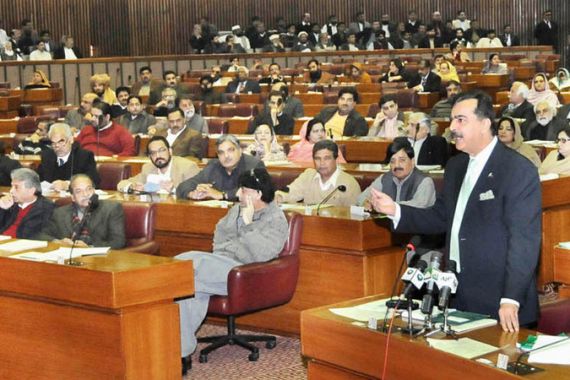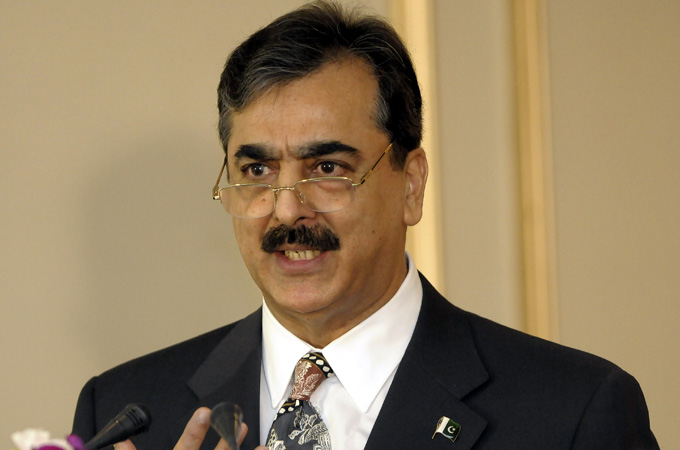Pakistan: What happens next?
Country at the crossroads as elected government battles legal and political challenges.

 |
| Yousuf Raza Gilani, Pakistan’s prime minister, is coming under increasing pressure from multiple fronts [EPA] |
With the Pakistani government, led by the Pakistan People’s Party (PPP), under immense pressure from the judiciary, the opposition and the powerful military, Al Jazeera looks at possible scenarios of how things could develop in Islamabad:
| PM FORCED TO STEP DOWN |
The Supreme Court has convicted Prime Minister Yousuf Raza Gilani of contempt of court for “wilful flouting, disregard and disobedience” of the court’s orders relating to the reopening of corruption cases. It sentenced him to a symbolic detention until the court’s adjournment, which lasted only minutes.
Gilani’s lawyer has said he will appeal the verdict.
The apex court wants the government to end the blanket amnesty it granted graft-tainted politicians under the National Reconciliation Ordinance (NRO). In particular, the court directed Gilani to reopen a corruption case in a Swiss court against President Asif Ali Zardari, who is also the co-chairperson of the PPP.
There is still debate as to whether the conviction in the case now disqualifies Gilani from holding public office, under Article 63 of the Pakistani constitution. Under that article, the speaker of the lower house of parliament has the prerogative to decide whether an issue of disqualification has arisen, and, if so, has 30 days to refer the matter to the country’s Election Commission.
The Election Commission then has 90 days to make a decision on whether to disqualify the member of parliament.
| EARLY ELECTIONS |
Most observers suggest that the most likely outcome of the current crisis is the holding of elections before the current parliament, dominated by the PPP and its allies, completes its term in March 2013.
There are several mechanisms through which this could happen. The opposition may also initiate a vote of no-confidence against Prime Minister Gilani.
Alternately, PM Gilani could resign as a result of heightening pressure from both the judiciary and the opposition.
| PRESIDENTIAL IMPEACHMENT |
The Supreme Court wants the government to pursue a dormant corruption case in Swiss courts against President Zardari and his wife, the late Benazir Bhutto.
The PPP and Gilani’s government contend that Zardari is guaranteed immunity from prosecution under Article 248 of the Pakistani constitution. It is a point that the court has conceded is worthy of further investigation.
President Zardari has also come under fire for a secret note allegedly written by a former ambassador to the US, offering to reorient the country’s security apparatus in line with Washington’s regional objectives in exchange for US support for the government in the event of a military coup.
The affair, now known as “Memogate” is the subject of ongoing judicial and parliamentary investigations. If Zardari is found involved in any way, he may face impeachment proceedings in parliament.
| POLITICAL STATUS QUO |
In its January 10 short order on the NRO case, the Supreme Court notes:
The constitutional balance vis-à-vis trichotomy and separation of powers between the Legislature, the Judiciary and the Executive is very delicately poised and if in a given situation the Executive is bent upon defying a final judicial verdict and is ready to go to any limit in such defiance then instead of insisting upon the Executive to implement the judicial verdict and thereby running the risk of bringing down the constitutional structure itself this Court may exercise judicial restraint and leave the matter to the better judgment of the people of the country or their representatives in the Parliament to appropriately deal with the delinquent.”
This text has been variously interpreted, but it would appear to be an option whereby the court does not make binding requirements of the government, allowing the parliament to regulate itself.
The judiciary also has the option of not taking direct action against the top political leadership, preferring instead to book relatively lower-level officials.
With the PM’s conviction in the contempt case, however, it would appear this option is increasingly unlikely.
| MILITARY COUP |
Tensions between the civilian government and the country’s powerful military have been high for the last several years, though they have cooled in recent months.
Matters between the two sides came to a head early this year, when PM Gilani accused the country’s army chief and the head of its main intelligence agency of acting illegally while responding to queries by the apex court over the “Memogate” scandal.
He then fired his defence secretary, a retired Lieutenant General considered to be close to the military leadership, for “gross misconduct and illegal action” related to the same case.
The military hit back, warning the elected government of “very serious ramifications with potentially grievous consequences for the country”.
Analysts, however, have largely discounted the possibility of a military coup in the current scenario, given that the military needs public support in order to continue domestic operations against armed groups, and the dire state of the economy.